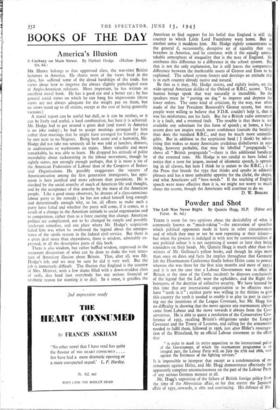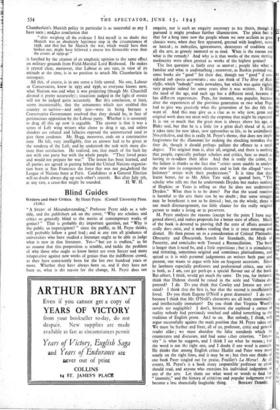Powder and Shot
The Left Was Never Right. By Quintin Hogg, M.P. (Faber and Faber. 4s. 6d.)
THERE is room for two opinions about the desirability of- what is commonly known as "muck-raking "—the excavation of speeches which political opponents made in haste in other circumstances and of which they may or not be now repenting at their leisure— but when the process is indulged in with zest by controversialists of one political colour it is not surprising if sooner or later they bring rejoinders on their heads. Mr. Quintin Hogg is much abler than the writers of Mr. Gollancz's yellow books, and though he trips more than once on dates and facts (he implies throughout that Germany left the Disarmament Conference finally before Hitler came to power, whereas she was there for the first nine months and more of 1933; and it is not the case that a Labour Government was in office in Britain at the time of the Corfu incident) he disposes conclusively of the legend that the Left were the upholders, and the Right the betrayers, of the doctrine of collective security. We have learned by this time that any international organisation to be effective must have "teeth in it"; neither party was willing in the thirties to give this country the teeth it needed to enable it to play its part in carry- ing out the intentions of the League Covenant, but Mr. Hogg has no difficulty in showing that the move against any rearmament always came from Labour and the move towards it always from the Con- servatives. He is able to quote a resolution of the Conservative Con- ference of 1935, recalling Britain's obligations under the League Covenant and the Treaty of Locarno, and calling for the armaments needed to fulfil them, followed in 1936, just after Hitler's reoccupa- tion of the Rhineland, by an official Labour statement to the effect that
"in order to mark its entire opposition to the international policy of the Government, of which the rearmament programme is as integral part, the Labour Party- will, on July the 27th and 28th, vote against the Estimates of the fighting services."
It is impossible to interpret that except as a condemnation of re- armament against Hitler, and Mr. Hogg demonstrates effectively the apparently complete unconsciousness on the part of the Labour Party of any serious German menace at all. Mr. Hogg's exposition of the failure of British foreign policy from the time of the Abyssinian affair, or for that matter the Japanese affair of 1931, onwards, is able and convincing. His defence of Mr. Chamberlain's Munich policy in particular is as successful as any I have seen ; andjus conclusion that
"after weighing all the evidence I find myself in no doubt that Munich was an absolutely legitimate step in the circumstances of 1938, and that but for Munich the war, which would have then broken out, might have followed a couise less favourable even than the events of 1939-41
is fortified by the citation of an emphatic opinion to the same effect on military grounds from Field-Marshal Lord Birdwood. He makes it crystal clear, moreover, that Labour at any rate, in view of its attitude at the time, is in no position to attack Mr. Chamberlain in retrospect.
All this, of course, is in one sense a little unreal. No one, Labour or Conservative, knew in 5935 and 5936, as everyone knows now, what Nazism was and what it was projecting (though Mr. Churchill divined it pretty accurately) ; situations judged in the light of events will not be judged quite accurately. But this conclusion, at least, seems incontestable, that the armaments Which just enabled this country to survive—and only just—were in being because a Conservative Government resolved that they should be, in face of pertinacious opposition by the Labour party. Whether it is unseemly to drag all this up now is arguable. The answer is that it was a series of Left wing writers who chose to drag it up, and unless slanders are refuted and fallacies exposed the uninstructed tend to give them credence. Mr. Hogg, moreover, ends on a constructive note. He felt, very intelligibly, that an answer had to be given to the vendetta of the Left, and he undertook the task with more dis- taste than satisfaction. He realised, too, that much of the fault lay not with one party but with the whole people. "'They loved peace and would not prepare for war." The lesson has been learned, and all parties are agreed in putting behind the United Nations organisa- tion born at San Francisco the force that was not put.behind the League of Nations born at Paris. Candidates at so General Election will no doubt always dig up each other's records. But after July sth, at any rate, a cease-fire might be sounded. H. W. H.



























 Previous page
Previous page